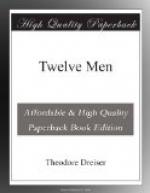But the manner in which L—— developed in this atmosphere! It was interesting. At first, before the magazine became so significant or well-organized, it was a great pleasure for me to associate with him outside office hours, and a curious and vivid companion he made. He was so intensely avid of life, so intolerant of the old, of anything different to that which he personally desired or saw, that at times it was most difficult to say anything at all for fear of meeting a rebuff or at least a caustic objection. As I was very pleased to note, he had a passion for seeing, as all youth should have when it first comes to the great city—the great bridges, the new tunnels just then being completed or dug, the harbor and bay, Coney Island, the two new and great railway terminals, then under construction. Most, though, he reveled in different and even depressing neighborhoods—Eighth Avenue, for instance, about which he later wrote a story, and a very good one ("A Quiet Duet"); Hell’s Kitchen, that neighborhood that lies (or did), on the West Side of Manhattan, between Eighth and Tenth Avenues, Thirty-sixth and Forty-first Streets; Little Italy, the region below Delancey and north of Worth Street on the East Side; Chinatown; Washington Street (Syria in America); the Greeks in Twenty-seventh and -eighth Streets, West Side. All these and many more phases of New York’s multiplex life took his full and restless attention. Once he said to me quite excitedly, walking up Eighth Avenue at two in the morning—I was showing him some rear tenement slums in the summertime—“God, how I hate to go to bed in this town! I’m afraid something will happen while I’m asleep and I won’t see it!” That was exactly how he felt all the time, I am sure.
And in those days he was most simple, a very Spartan of a boy. He hadn’t the least taste for drink, lived in a small hall-bedroom somewhere—Eighth Avenue, I believe—and took his meals in those shabby little quick-lunch rooms where the characters were more important to him than the food. (My hat—my hat is in my hand!) Intellectually he was so stern and ambitious that I all but stood in awe of and reverence before him. Here, I said to myself, is one who will really do; let him be as savage as he pleases. In America he probably needs to be.
And during this short time, what scraps of his early life he revealed! By degrees I picked up bits of his early deprivations and difficulties, if such they might be called. He had been a newspaper reporter, or had tried to be, in Kansas City, had worked in the college restaurant and laundry of the middle-West State university from which he had graduated, to help pay his way. Afterward he had assisted the janitor of some great skyscraper somewhere—Kansas City, I believe—and, what was most pleasing to me, he in nowise emphasized these as youthful difficulties or made any comment as to their being “hard.” Neither did he try to boastingly minimize them as nothing at all—another wretched pose. From him I learned that throughout his youth he had been carried here and there by the iron woman who was his mother and whom he seemed to adore in some grim contentious way, smothering his comments as though he disliked to say anything at all, and yet describing her at times as coarse and vulgar, but a mother to him “all right,” someone who had made marked sacrifices for him.




